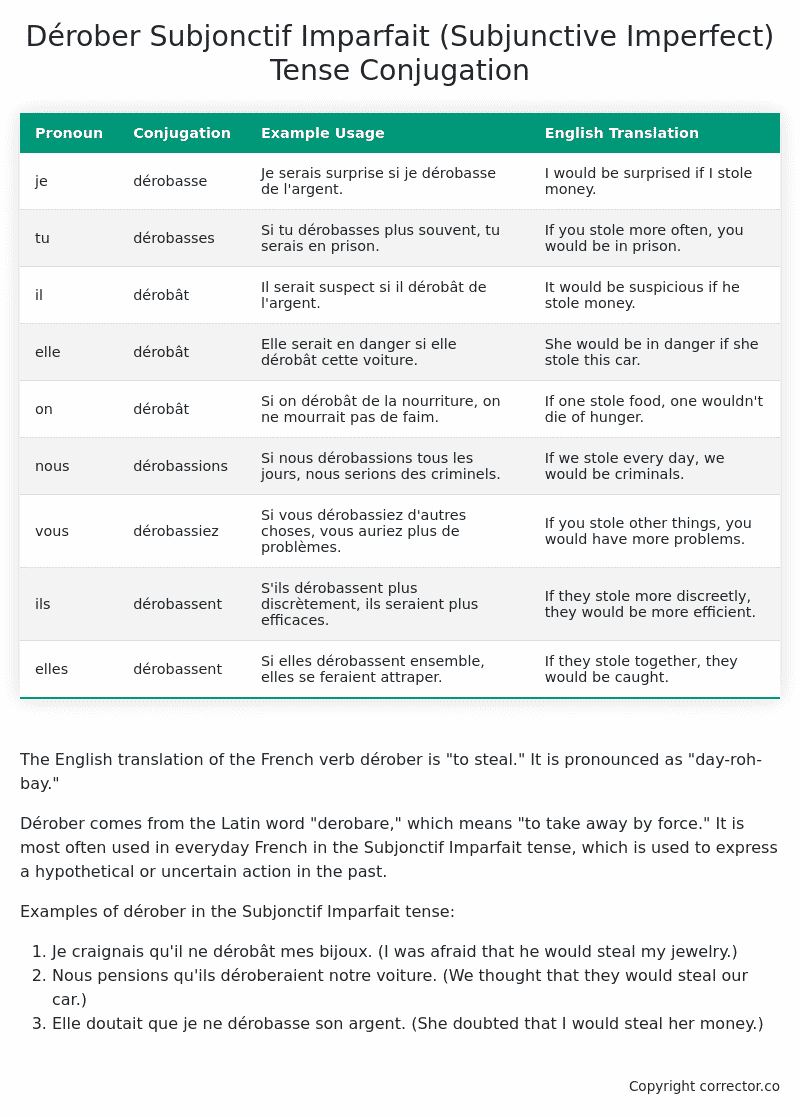Subjonctif Imparfait (Subjunctive Imperfect) Tense Conjugation of the French Verb dérober
Introduction to the verb dérober
The English translation of the French verb dérober is “to steal.” It is pronounced as “day-roh-bay.”
Dérober comes from the Latin word “derobare,” which means “to take away by force.” It is most often used in everyday French in the Subjonctif Imparfait tense, which is used to express a hypothetical or uncertain action in the past.
Examples of dérober in the Subjonctif Imparfait tense:
- Je craignais qu’il ne dérobât mes bijoux. (I was afraid that he would steal my jewelry.)
- Nous pensions qu’ils déroberaient notre voiture. (We thought that they would steal our car.)
- Elle doutait que je ne dérobasse son argent. (She doubted that I would steal her money.)
Table of the Subjonctif Imparfait (Subjunctive Imperfect) Tense Conjugation of dérober
| Pronoun | Conjugation | Example Usage | English Translation |
|---|---|---|---|
| je | dérobasse | Je serais surprise si je dérobasse de l’argent. | I would be surprised if I stole money. |
| tu | dérobasses | Si tu dérobasses plus souvent, tu serais en prison. | If you stole more often, you would be in prison. |
| il | dérobât | Il serait suspect si il dérobât de l’argent. | It would be suspicious if he stole money. |
| elle | dérobât | Elle serait en danger si elle dérobât cette voiture. | She would be in danger if she stole this car. |
| on | dérobât | Si on dérobât de la nourriture, on ne mourrait pas de faim. | If one stole food, one wouldn’t die of hunger. |
| nous | dérobassions | Si nous dérobassions tous les jours, nous serions des criminels. | If we stole every day, we would be criminals. |
| vous | dérobassiez | Si vous dérobassiez d’autres choses, vous auriez plus de problèmes. | If you stole other things, you would have more problems. |
| ils | dérobassent | S’ils dérobassent plus discrètement, ils seraient plus efficaces. | If they stole more discreetly, they would be more efficient. |
| elles | dérobassent | Si elles dérobassent ensemble, elles se feraient attraper. | If they stole together, they would be caught. |
Other Conjugations for Dérober.
Le Present (Present Tense) Conjugation of the French Verb dérober
Imparfait (Imperfect) Tense Conjugation of the French Verb dérober
Passé Simple (Simple Past) Tense Conjugation of the French Verb dérober
Passé Composé (Present Perfect) Tense Conjugation of the French Verb dérober
Futur Simple (Simple Future) Tense Conjugation of the French Verb dérober
Futur Proche (Near Future) Tense Conjugation of the French Verb dérober
Plus-que-parfait (Pluperfect) Tense Conjugation of the French Verb dérober
Passé Antérieur (Past Anterior) Tense Conjugation of the French Verb dérober
Futur Antérieur (Future Anterior) Tense Conjugation of the French Verb dérober
Subjonctif Présent (Subjunctive Present) Tense Conjugation of the French Verb dérober
Subjonctif Passé (Subjunctive Past) Tense Conjugation of the French Verb dérober
Subjonctif Imparfait (Subjunctive Imperfect) Tense Conjugation of the French Verb dérober (this article)
Subjonctif Plus-que-parfait (Subjunctive Pluperfect) Tense Conjugation of the French Verb dérober
Conditionnel Présent (Conditional Present) Tense Conjugation of the French Verb dérober
Conditionnel Passé (Conditional Past) Tense Conjugation of the French Verb dérober
L’impératif Présent (Imperative Present) Tense Conjugation of the French Verb dérober
L’infinitif Présent (Infinitive Present) Tense Conjugation of the French Verb dérober
Struggling with French verbs or the language in general? Why not use our free French Grammar Checker – no registration required!
Get a FREE Download Study Sheet of this Conjugation 🔥
Simply right click the image below, click “save image” and get your free reference for the dérober Subjonctif Imparfait tense conjugation!

Dérober – About the French Subjonctif Imparfait (Subjunctive Imperfect) Tense
Formation
Common Everyday Usage Patterns
Interactions with Other Tenses
Subjonctif Présent
Indicatif Passé Composé
Conditional
Conditional Perfect
Summary
I hope you enjoyed this article on the verb dérober. Still in a learning mood? Check out another TOTALLY random French verb conjugation!


